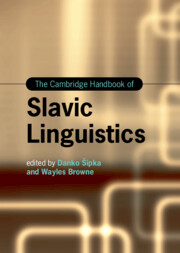Book contents
- The Cambridge Handbook of Slavic Linguistics
- Cambridge Handbooks in Language and Linguistics
- The Cambridge Handbook of Slavic Linguistics
- Copyright page
- Contents
- Figures
- Tables
- Contributors
- Introduction
- Part 1 Prosody and Phonology
- Part 2 Inflectional and Derivational Morphology
- Part 3 Syntax
- Part 4 Lexicon
- Part 5 Sociolinguistic and Geographical Approaches
- 26 Sociolinguistic Variation in Slavic Languages
- 27 False Cognates
- 28 Dialectal Fragmentation
- 29 Language Contacts
- 30 The Slavic Literary Micro-Languages
- 31 Heritage Language Forms
- 32 Scripts
- 33 Orthographies
- Part 6 Experimental and Quantitative Approaches
- Name Index
- Subject Index
- References
30 - The Slavic Literary Micro-Languages
from Part 5 - Sociolinguistic and Geographical Approaches
Published online by Cambridge University Press: 16 May 2024
- The Cambridge Handbook of Slavic Linguistics
- Cambridge Handbooks in Language and Linguistics
- The Cambridge Handbook of Slavic Linguistics
- Copyright page
- Contents
- Figures
- Tables
- Contributors
- Introduction
- Part 1 Prosody and Phonology
- Part 2 Inflectional and Derivational Morphology
- Part 3 Syntax
- Part 4 Lexicon
- Part 5 Sociolinguistic and Geographical Approaches
- 26 Sociolinguistic Variation in Slavic Languages
- 27 False Cognates
- 28 Dialectal Fragmentation
- 29 Language Contacts
- 30 The Slavic Literary Micro-Languages
- 31 Heritage Language Forms
- 32 Scripts
- 33 Orthographies
- Part 6 Experimental and Quantitative Approaches
- Name Index
- Subject Index
- References
Summary
This chapter discusses Slavic literary micro-languages, language forms typically used by Slavic minority groups with (to some extent) established traditions of literacy. In the past, these languages were often dealt with under dialectology, with a special note that a given dialect has a written form. The status of those minority languages is often disputed, in the sense that there are discussions – often politically oriented – on whether to give them the status of languages of their own, or of dialects of a language X, or some status between the two (with or without a written form). This chapter presents geographical distribution, status, and other characteristics of these languages and goes on to generalize their status and features into broader, theoretically relevant patterns.
Keywords
- Type
- Chapter
- Information
- The Cambridge Handbook of Slavic Linguistics , pp. 641 - 656Publisher: Cambridge University PressPrint publication year: 2024

